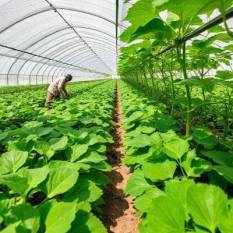DINDIGUL, 27 June 2025: A quiet revolution is transforming vegetable farming in Dindigul, thanks to the Indo-Israel Agricultural Project and its flagship Centre of Excellence for Vegetables at Rediyyarchatram. Established in 2013 on 5.33 hectares, the centre showcases technology-driven methods such as poly greenhouses, advanced drip irrigation, and insect-proof net houses that are giving traditional farmers the confidence to adopt modern farming.
Over the past decade, demonstration plots at the centre have helped farmers understand the benefits of precision farming. Many have shifted from open-field traditional crops to protected cultivation of high-value vegetables like tomatoes, eggplants, cucumbers, and melons.
Among them is farmer G. Muthulakshmi, who along with her son Karthikeyan, a former mechanical engineer, embraced polyhouse technology on their one-acre farm in 2016. Their half-acre polyhouse now generates nearly INR 12 lakh profit per year through English cucumber cultivation, a vast improvement over previous groundnut and shallot harvests vulnerable to weather swings.
S. Dileep, Deputy Director of Horticulture, highlighted how polyhouse farming significantly cuts down pest and pathogen threats, reducing pesticide use to near zero and slashing manpower costs. Satish, a researcher at the Centre, added that pathogen-free portray seedling trays, automated fertigation, and mulching practices are driving higher survival rates and lush crop growth.
“Moisture retention is far better with mulch covers, weeds are controlled, and fertiliser is precisely delivered,” he said.
While India’s small landholding pattern poses a challenge to wider adoption, officials believe collective models such as Farmer Producer Organisations (FPOs) could help smallholders access technology affordably. “If organised well, FPOs can support infrastructure like cold storage and packaging units, positioning Dindigul as a future export hub,” Satish explained.
The project also aligns with the growing demand for sustainable, high-yield vegetable farming as climate challenges intensify. With support like 50% government subsidies for polyhouse construction, officials at the centre remain optimistic that Dindigul will soon emerge as a major vegetable export cluster.




















